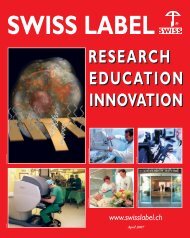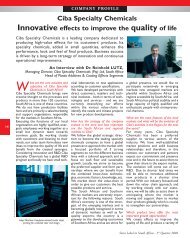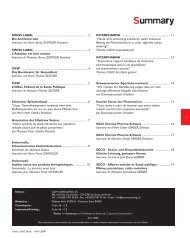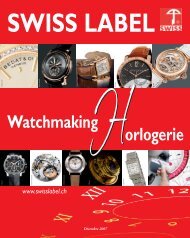SWISS LABEL INFORMATIQUE-XP - Com Consulting SA
SWISS LABEL INFORMATIQUE-XP - Com Consulting SA
SWISS LABEL INFORMATIQUE-XP - Com Consulting SA
Create successful ePaper yourself
Turn your PDF publications into a flip-book with our unique Google optimized e-Paper software.
Fields of paediatricsInterview with Professor Sergio Fanconi,director of the department of Paediatrics and Paediatric SurgeryIt would be an exaggeration to say that the child is king, especially in the context of healthcare! However, we canclaim that the CHUV attaches the greatest importance to the medical needs of children and has specially adaptedunits for paediatrics. The Department of Paediatrics and Paediatric Surgery (DMCP), run by Professor Sergio Fanconi,employs around 700 staff and has the triple mission of clinical care, teaching and research. Professor Fanconi kindlyagreed to answer our questions.© CEMCAV-CHUV, Eric Deroze.Do you collaborate much with other departments, in particular withgynaecology and obstetrics?Collaboration is very important. In certain cases, collaboration withgynaecology and obstetrics begins even before birth. Neonatology,which is a special division of the DMCP, focuses on a precise age, frombirth up to 4 weeks. If the problem is minor, the newborn child is treatedon the maternity ward. In more serious cases, the baby is transferredto neonatology. An important part of our work consists of looking afterpremature babies. At a general level, I would say that collaborationwith doctors working in the adult world is very important, especiallyin the field of highly specialized medicine, but also that children, whomake up 20% of the population, require specific structures.What is the upper age limit for treatment in paediatrics?The WHO has defined paediatric age going from birth to 18 years.The WHO children’s chart gives them the right to be treated in apaediatric unit and not with adults. I do feel that it is problematic thata child, or even a young person up to 18 years, should be hospitalisedtogether with adults whose average age is likely to be around 75.What type of surgery do you practise?Paediatric surgery is a specific training for operations in children. It coversmany different areas, from traumatology to abdominal and pulmonaryproblems. At the CHUV, as at the University Hospital of Geneva,paediatric surgery and paediatrics cover both, highly specialised medicineand primary care medicine, such as the treatment of appendicitis, forexample. An important part of our work is done in collaboration withspecialists for adult patients. One can quite easily manage the generaland the specialised together. Ideally, the specialist remains in dailySwiss Label CHUV 2010contact with general paediatrics as a good paediatric specialist is firstof all a good general paediatrician.Your department has a molecular paediatric unit.The CHUV is a specialised centre of excellence in this area togetherwith the Kinderspital in Zürich. This unit treats what we call “orphandiseases”, in other words rare diseases that are the result of inbornerrors of metabolism. A molecule doesn’t work properly for geneticreasons and causes a disease like tyrosinaemia for example (degenerationof the liver). We look after these patients and we also conductadvanced research in this field.You have a palliative care team.There are relatively few deaths in paediatrics, around twenty a year inthe canton of Vaud, but it is a tragedy every time. Since 4 years wehave a small team of two nurses supported by an anaesthetist and thisconcept is very successful. It provides help for patients and nursingstaff in hospital or at home. We assist the other French-speakingcantons as much as we can because, apart from Geneva, they do nothave any team of this kind.Can you tell us briefly about the multidisciplinary unit for adolescenthealthcare?This unit is run by Professor Michaud, and it looks after the classicproblems encountered at this transitional age such as alcohol and drugabuse, obesity, anorexia, etc. The aim is not to look after all adolescentswith problems, but to provide support to the paediatricians and physicianstreating these adolescents.Finally, what kind of research does your department carry out?We have three research laboratories in molecular paediatrics, neonatologyand oncology. We also carry out research in the area of tissue engineeringin association with the EPFL and in the area of tissue replacement inburns in collaboration with the department of gynaecology and obstetrics.Added to this is clinical research in general paediatrics and in the differentspecialties.CHUV – DMCP Département médico-chirurgical de pédiatrieRue du Bugnon 46CH-1011 LausanneTel.: +41 (0)21 314 36 18E-mail: dmcp@chuv.chWebsite: www.chuv.ch/pediatrie13














